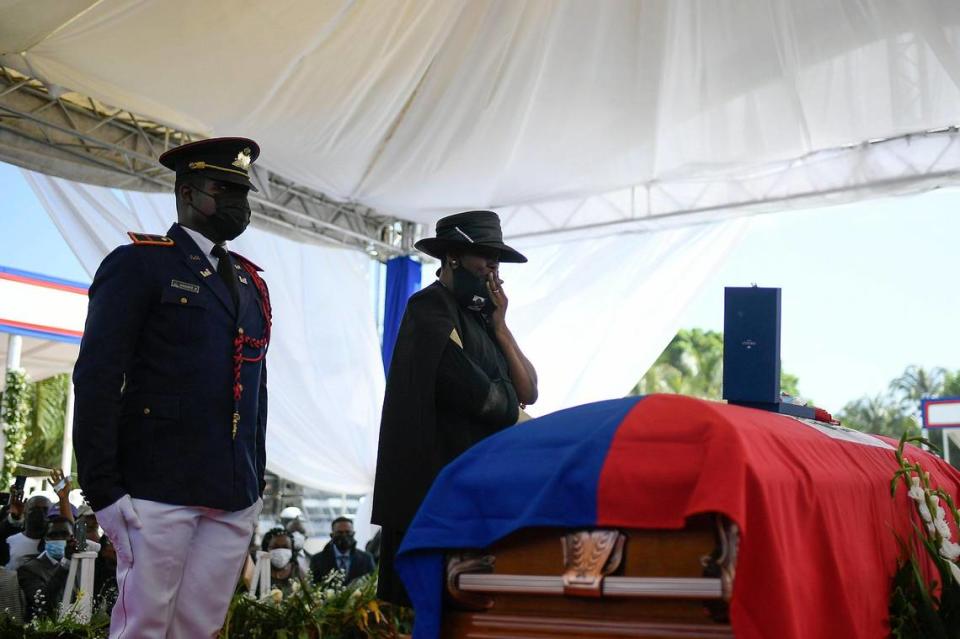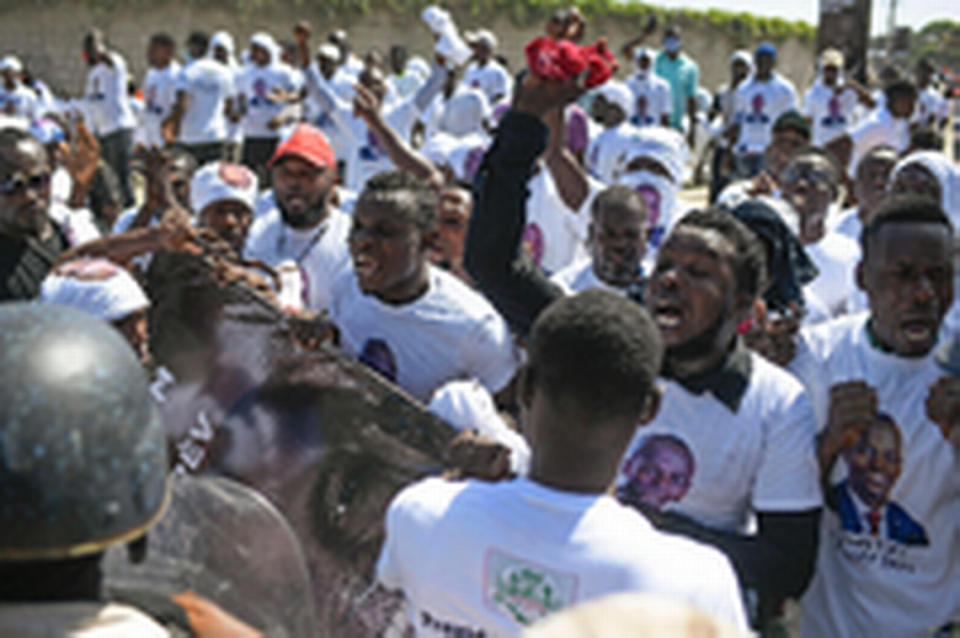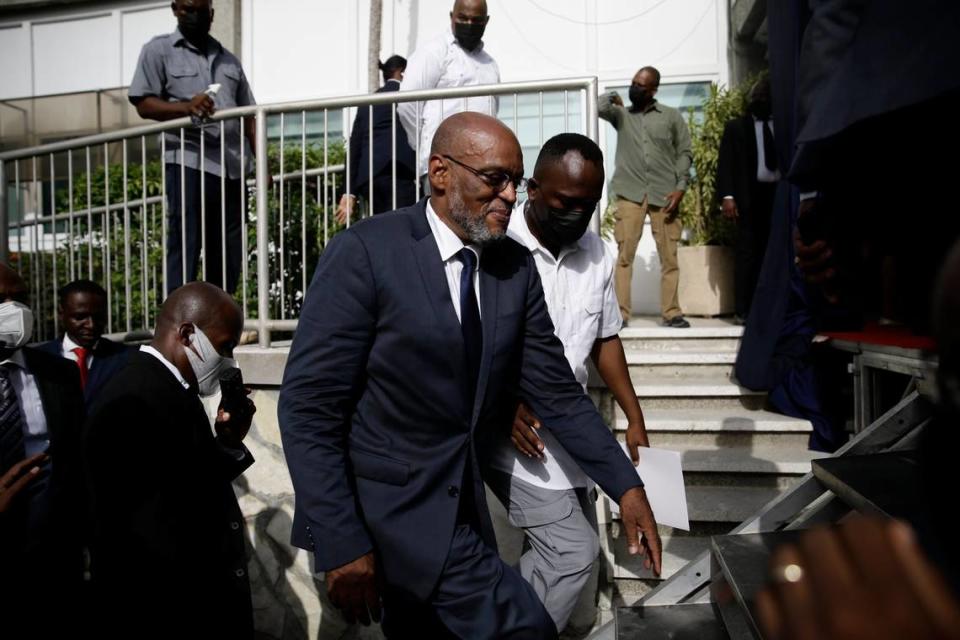In exclusive interview, Haiti prime minister says he’d hand assassination suspects to U.S.
In a statement likely to stir up a political storm, Haiti’s interim prime minister told the Miami Herald he would support sending suspects in the assassination of Haiti’s president to Miami to face murder conspiracy charges if U.S. authorities ask.
Prime Minister Ariel Henry said Friday he would be willing to turn over certain Haitian Americans, Colombians and others in custody who are suspected of collaborating with a Miami-area security firm in a conspiracy to kidnap and kill President Jovenel Moïse last July in his hillside residence outside Port-au-Prince.
“I support the U.S. effort,” Henry told the Miami Herald in an exclusive, wide-ranging interview. “If they ask, they will have the full cooperation of the nation.”
During the interview, Henry, 72, denied reports as “fake news” that he was involved in the assassination of the president and was protecting a key suspect, Joseph Félix Badio, who has been on the lam. Badio, who worked in intelligence for the Haitian government justice ministry and anti-corruption division, was believed to be tracking the president’s whereabouts the night he was killed. He is accused by Haiti police of bribing Moïse’s guards to stand down during the attack.
“I want to make a public announcement to say to Badio to turn himself in to the police and then we’ll know the truth,” Henry said. “For the justice part of this case, he has to turn himself in.”
Henry does have the authority to decide whether to hand over to U.S. investigators any of the roughly 40 suspects currently in custody in Haiti in connection with the president’s assassination. Among them: a Haitian American who is suspected of seeking the assistance of the head of the Miami-area security firm, CTU, that hired Colombian commandos implicated in Moïse’s murder.
But the issue for Henry, a neurosurgeon who was appointed prime minister by Moïse one month before the president’s death, is whether he is willing to spend the political capital to make it happen.

Last week, as part of a separate U.S. probe, two FBI agents flew to Port-au-Prince to interview some of the Haitian-American suspects being held at the National Penitentiary. The U.S. case is being built around a man identified as co-conspirator #1 in two federal criminal complaints and a trip he allegedly took to South Florida in late June to seek assistance from CTU in the plot to remove Haiti’s president.
U.S. officials have not publicly identified the suspect, but the Herald has confirmed that he is James A. Solages, a former Broward County resident and one of three Haitian Americans jailed in Port-au-Prince in the crime. Solages left Haiti on June 28 and returned on July 1, according to the FBI complaints filed in Miami federal court.
The Herald has learned that Solages shared information with CTU, the security firm owned by Antonio Intriago, related to the plot to remove Moïse. Intriago’s lawyer, Joseph Tesmond, did not return messages and calls seeking comment, but he has said in the past that his client was unaware of the assassination plot.
Henry’s previously undisclosed willingness to turn over suspects held in Haiti is likely to provoke opposition from some Haitian officials, including the minister of justice. The justice minister has said he is not willing to turned over any of the individuals jailed in Haiti to the United States because it was not an American president who was killed.
“The judgment has to be done in Haiti,” Justice Minister Berto Dorcé said.
Whenever Haiti turns over anyone to the United States, whether accused foreign nationals or presumed drug traffickers, it is always problematic, seen by some as a violation of sovereignty.
Henry said that while he still supports the Haiti justice ministry’s investigation of the July 7 assassination, he believes the agency is “weak’ and that any assistance from the U.S. government’s probe would be “welcomed.”
Henry also said he believes an international judge should be brought to assist in the case, and he plans to seek the assistance of the 15-member Caribbean Community, of which Haiti is a member, to bring an element of independence to the Haitian probe.

More than seven months after Moïse was shot 12 times by assassins and his wife, Martine, was left for dead but survived, the investigation in Haiti has stalled and is now headed to its fourth investigative judge after one magistrate stepped down and another informed the head of the court system this past week that he will have to refuse the case out of concern for his safety.
The judge who had been overseeing the probe, Garry Orélien, was forced to step down because of allegations of corruption in his handling of the assassination case. After four months, Orélien also had failed to bring any formal charges against any of the 44 people jailed in the slaying. He is currently the subject of an investigation by the Superior Council of Judicial Power after he was accused of shaking down the owners of a rental company allegedly connected to the killing.
The lack of progress has provoked criticism that Henry, whose status is interim, lacks the political will to find out who killed the president, a charge that he denies.
“I want to stay out of the matter,” he said. “I am letting the justice department say who committed the crime, and who has to go to jail. ...I’m confident that the truth will come out.”

More than once, Henry said he knows that his phone has been bugged. Henry said he has not been questioned by any Haitian or U.S. authorities investigating the murder. He said he has refused to read a Haitian police investigative report, waiting for the justice system to do its job.
Henry himself has been accused by critics of being involved in the plot — an accusation that he strongly denied. He questioned the veracity of reports this week that Orélien accused him in a recorded conversation of being part of the assassination’s planning. Several people believe that the recent release of that recording was an attempt to smear Henry, who is increasingly under pressure to step down by foes using the assassination allegations against him.
“What I know is that the same judge said he didn’t say that,” Henry said, referring to a radio interview in Creole by Orélien denying he made the statement. “So who to believe? He has to prove where he [got ] the information if he has the information.
“What I know is that I have not been part of that plot of the assassination of the president and I’m looking for justice to be done,” he said.
So far in the U.S. case, two foreign suspects have surrendered to the FBI and Homeland Security Investigations to face murder conspiracy charges. They are Mario Antonio Palacios Palacios, an ex-Colombian soldier, and Rodolphe Jaar, previously convicted in the United States of drug-trafficking.
Haiti prime minister and opposition group meet. Each had different plans for exiting crisis.
In January, Palacios was transferred to the United States from Panama during a stopover as he was being deported from Jamaica to Colombia, and Jaar was shipped to the United States from the Dominican Republic. Both had been on the lam since the assassination.
Both defendants’ arraignments have been delayed as they appear to be cooperating with U.S. authorities in Miami while they are being held at the Federal Detention Center. Both could help strengthen any U.S. conspiracy case against Haitian, Colombian and South Florida suspects in the assassination of Haiti’s president, according to law enforcement sources.
U.S. authorities also have their eyes on a third suspect, John Joël Joseph, a former senator who was arrested last month in Jamaica. FBI agents have already started interviewing Joseph, who has a scheduled court appearance in Jamaica next week on immigration violation charges.
According to one FBI complaint, Palacios, 43, also known as “Floro,” traveled to Haiti about a month before the assassination. Palacios was in contact with at least one of three now-jailed Haitian Americans in Port-au-Prince — Solages, the unidentified co-conspirator in the FBI complaint — before he, Solages and others stormed the president’s compound in the middle of the night yelling that a DEA operation was under way.
The attack had been launched from the nearby home of Jaar, a former Drug Enforcement Administration informant. He is accused of playing a central role in providing housing, weapons and other support to the group of Colombian commandos suspected of murdering Moïse.
Jaar, 49, is accused of meeting with Solages before the deadly plot was carried out. Jaar is also accused of helping Solages and others allegedly tied to Moïse’s assassination hide in its aftermath, according to the second FBI complaint. The Herald has learned that Solages, a former maintenance man who quit his job in April, went to work for CTU, the Miami-area security firm implicated in the plot.
During an interview in December while in hiding in Port-au-Prince and weeks before his arrest, Jaar admitted to U.S. investigators that “he provided firearms and ammunition to the Colombians to support the assassination operation,” the FBI complaint says. “He stated that the operation changed from an arrest ... [to remove Moïse from office] to an assassination operation after the initial plan to ‘capture’ the Haitian president at the [Port-au-Prince] airport and take him away by plane did not go forward.”
The 124-page Haitian investigative police report, which was obtained by the Herald, said that in the weeks leading up to the president’s killing, Jaar attended several meetings where both Colombian and Haitian suspects, including Badio, were present. Badio, police said, rented an apartment not far from the president’s residence, from which he spied on the head of state.
Henry’s supposed connection to the assassination plot stems from two calls. The Haitian police investigative report said he received the first from Badio at 4:03 a.m. and another from him at 4:20 a.m on the morning of the assassination. In a two-page document, former prosecutor Bed-Ford Claude said the calls lasted a total of seven minutes and that Henry was at the Hotel Montana in Port-au-Prince at the time.
Claude later tried to get a judge to charge the prime minister and to bar Henry from leaving Haiti, a move legal experts said was illegal because the case was in the hands of an investigative judge.
On the day Claude made the request, a letter from Henry showed that Claude had been fired the day before. Soon after, Claude’s boss, Justice Minister Rockefeller Vincent, was also fired. The two, along with former Foreign Minister Claude Joseph — Henry’s predecessor as acting prime minister, who was still in place at the time of the assassination — have waged a public campaign to get Henry removed from office.
Asked if he had been aware of the plot targeting the president, Henry said he knew nothing and “If I was informed I would have talked to the president about it.”
“For me, those who are involved have to be captured,” Henry said. “They said that I talked to one of the instigators, Badio. I don’t recollect that I talked to him. But even if I did talk to him, it was not important for me because I don’t remember having talked to him. I have to remind you that that day, I received several phone calls. I talked to a lot of people.”
Henry said the first call he received about Moïse’s assassination was from a journalist. He said he did not believe the journalist’s story. Later, he received a phone call informing him that then-police chief Léon Charles would call to brief him. When the call from Charles never came, Henry started to “think it was a coup from the police” and fled his home with his police security for the Karibe hotel in Pétionville.
“There, suddenly they took my security,” he said. “It was the first time I had an escort. I don’t know who ordered the escort to come pick me up, and I don’t know who gave the order to take out the escort. But they received an order and they left and at that time really, I felt unsecured.”
Henry said he knows Badio, but contrary to what is being said about their relationship, the two did not speak frequently. Badio, he said, was in charge of intelligence for the justice ministry under Rockefeller Vincent, the minister he fired. Badio also was employed as a coordinator at the Unit for the Fight against Corruption (ULCC) before he was fired last year.
According to sources, Badio identified himself as a lawyer for CTU, which allegedly recruited the Colombian commandos who stormed the president’s home.
Henry said he has had no contact with Badio since the latter became a fugitive. He said the two last spoke on July 5, when someone suggested he reach out to Badio because he was an expert on intelligence and could offer advice on forming his government.
‘He’s not someone that I want a continuous relationship with,” Henry said. “I don’t know where he lives. He doesn’t know where I live.”

 Yahoo Sports
Yahoo Sports 